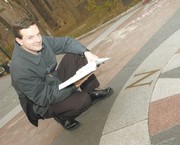Computer gaming goes to print
CIS graduate student publishes third book while attaining fifth college degree
The Daily Pennsylvanian
December 05, 2003

-
CIS Ph.D. candidate Nick Montfort cradles a copy of his latest published work, 'Twisty Little Passages.' The book is the first of its kind to tackle the computer gaming topic, interactive fiction.
Photo by Phil Leff/The Daily Pennsylvanian
Watch out, da Vinci, there's a new Renaissance Man in town.
With two bachelor's degrees, three master's degrees and three books to his name, 31-year-old Computer and Information Science doctoral student Nick Montfort isn't exactly your average Penn student.
While students and professors competed for a chance to play Zork or Varicella -- two widely acclaimed computer games -- Montfort talked over wine about his latest work, Twisty Little Passages.
The book is the first substantial study of the computer gaming genre known as interactive fiction.
Such programs allow players to direct their own plot in a digital world.
On Wednesday evening at a party showcasing his book, Montfort said he sees a need for serious academic study of interactive fiction.
"Many people looking at interactive fiction would say it's a game and not literature," he said. "It's interesting because it's a complex computer program and also interesting because it's literature... I don't see a contradiction."
Bantam Books' popular Choose Your Own Adventure children's series is one example of interactive fiction in print, but today most is written for computer and Internet gaming, allowing the genre to expand as never before.
Montfort cited social commentators, playwrights and the makers of the video game Grand Theft Auto as among those most influenced by interactive fiction since their efforts often take the shape of simulated worlds.
Montfort's interdisciplinary study traces the history of interactive fiction and identifies its first literary antecedent as the riddle.
If a riddle is text that requires a response from the reader, then "the idea of the riddle provides a way to understand interactive fiction," he explained.
Montfort began working with computer literary projects in middle school, where he wrote interactive fiction computer programs.
His undergraduate thesis for the University of Texas at Austin was his first serious academic review of the subject and served as a basis for his new book.
Montfort graduated with high honors from the university in 1995 with bachelor's degrees in Computer Science and Liberal Arts.
In 1998, he received an M.A. in Media Arts and Sciences from the Massachusetts Institute of Technology. As a research assistant he programmed a system to assist children in creative writing.
Montfort received a second M.A. in creative writing from Boston University in 2001, where he was the co-winner of the Academy of American Poets Prize.
He is now pursuing a Ph.D. at Penn and, in the course of his studies, received another M.A. from the Department of Computer and Information Science in May.
But Montfort's pursuits also venture beyond the realm of academia.
Currently he is curating an exhibit entitled, "Composing: Harry Mathews' Words and Worlds," for the Van Pelt-Dietrich Library's Kamin Gallery.
On the side he leads book and poetry readings at the Kelly Writers House.
Throughout his studies Montfort has worked as a journalist for Wired and Technology Review, among other publications.
And his accomplishments haven't gone unnoticed.
CIS Professor Michael Kearns, in an e-mail statement, called Montfort "an extraordinarily curious, broad and well-read person."
"Nick is unusual in that he has firm interests in the scientific, technological and sociological aspects of computer science," Kearns said, adding that he and Montfort have collaborated to offer a new course, CSE 112, "Networked Life."
Slated to be offered next semester, the class will tackle many of the issues in game theory, sociology and computer science that Montfort and Kearns are currently researching.
Reflecting on his academic life so far, Montfort said he hopes one day to become a professor at a major university.
For Penn students with lofty aspirations, Montfort offered this advice in an e-mail interview:
"Figure out what type of work you really love (scholarly or otherwise) and then find a context that allows you to pursue this work."
Indeed, Montfort asserts, Penn's unique CIS Department "was clearly the right place for me."
"Of course," added the award-winning poet, author and scholar, "I'll be continuing to ask others for advice as I work on my Ph.D., which will take me another few years."
